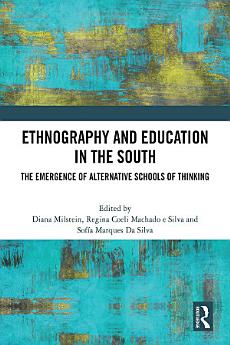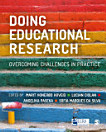Ethnography and Education in the South: The Emergence of Alternative Schools of Thinking
About this ebook
The term ‘South’ transcends geographical location to refer allegorically to the generation of situated knowledge and experience, and to original ways of producing knowledge that show how social theories about the modern world from non- hegemonic academies are equal in intellectual rigour and often of greater political relevance to our changing world. The chapters take education in an ample sense considering that educational processes extrapolate the school context and transcend institutionalised forms. The various singularities of the educational ethnographies exposed here try to make explicit aspects of this tension between universalizable and local ways of knowing. They reach issues of the relationship of collective knowledge with learning, cognition, socialization, transmission of culture, languages and corporeality. They also analyse local educational practices in scenarios of intense political conflict where issues such as poverty, migration, gender, ethnicity, memory, territory, and academic training intersect.
The book brings to light the range of contributions that emerged since the last decade of the twentieth century and stimulates the understanding of the breadth and extension of Ethnography and Education. It was originally published as a special issue of the journal Ethnography and Education.
About the author
Diana Milstein is Researcher in the Center of Social Research of National Council of Scientific and Technical Research at Institute of Economic and Social Development (CIS- CONICET- IDES), Argentina. She is an ethnographer with research interests in education and social construction of bodies, childhood, politics, and daily life in schools and ethnography with children. She sits on the Ethnography and Education journal’s Regional Editorial Board, and she coordinates the International Network of Ethnography with Children (RIENN).
Regina Coeli Machado e Silva has a PhD in social anthropology, is a professor at Unioeste (State University of Western Paraná, Brazil), and a researcher at the National Council for Scientific and Technological Development (CNPq). She has published numerous articles and editions of books linking anthropology to literature, education, and state borders. She is currently conducting ethnographies in school contexts.
Sofía Marques Da Silva is Associate Professor at the Faculty of Psychology and Educational Sciences of the University of Porto, Portugal, and full member of the Centre for Research and Intervention in Education at the same university. She has been involved in doing research on youth cultures, rural and border regions, resilient schools and communities, and the sense of belonging. She has been publishing at national and international level. She was the editor- in- chief of the journal Ethnography & Education (Taylor & Francis/Routledge) (2018– 2022) and belongs to the editorial board of the British Journal of Sociology of Education.





